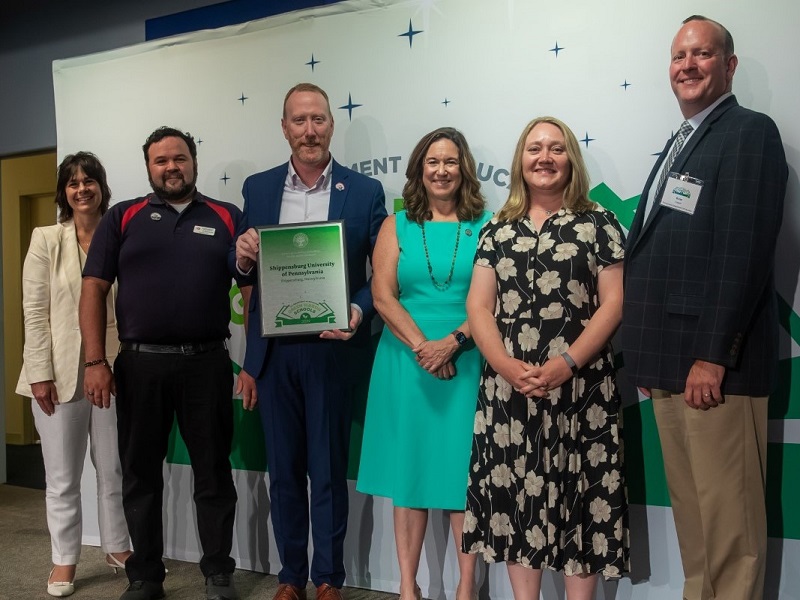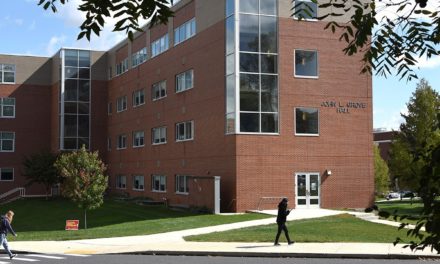Portions of this story were first published by the US Department of Education.
Representatives from the 2022 U.S. Department of Education Green Ribbon Schools, District Sustainability Awardees, and Postsecondary Sustainability Awardees were honored in a ceremony Tuesday, July 26 in Washington, DC. Officials from the schools, districts and postsecondary institutions received sustainably crafted plaques in tribute for their achievements.
On hand at the U.S. Department of Education was US Deputy Secretary of Education Cindy Marten, White House Council on Environmental Quality Chair Brenda Mallory, US Environmental Protection Agency Deputy Assistant Administrator Alejandra Núñez and White House Deputy National Climate Advisor Ali Zaidi. US Secretary of Energy Jennifer Granholm offered remarks via a pre-recorded video. Afterward, the Center for Green Schools at the U.S. Green Building Council hosted a reception in Washington, DC.
Across the country, 27 schools, five districts and four postsecondary institutions were honored for their innovative efforts to reduce environmental impact and utility costs, improve health and wellness, and ensure effective sustainability education. In addition, Jon Long with the North Carolina Department of Public Instruction was recognized for his efforts to advance school sustainability.
The honorees were named from a pool of candidates nominated by 19 states. The list of all selected schools, districts, colleges, and universities can be found here. A report with highlights on the honorees can be found here. More information on the federal recognition award can be found here. Resources for all schools to move toward the “three Pillars” – the threshold for achieving ED’s green school recognition – can be found here.
This award acknowledges college or university leadership that take a comprehensive approach to sustainability and demonstrate a commitment to a sustainable campus, health and environmental learning.
“Environmental sustainability is a way of life at Ship and a commitment we take seriously. I’m proud of the work our campus community does every day and it is rewarding to see our efforts honored on a national scale,” said Dr. Charles E. Patterson, interim president of Shippensburg University.
In 2015, the university decommissioned its Steam Plant and transitioned to natural gas, reducing its overall greenhouse gas footprint by 29 percent. In 2017, the university announced the creation of a sustainability major, combining a focus of sustainability with geotechnology and geographic information systems. The university is also home to an organic campus farm that provides a learning environment for students and fresh produce to food insecure families in the community.
In 2018, SU was named a Bicycle Friendly University by the League of American Bicyclists. A week each year is dedicated to the environment with the annual StewardShip celebration and In 2021 Ship obtained grant funding and donations to launch ShipComposts, a student initiative aimed at reducing food waste and carbon emissions on campus.”
Ship’s commitment to the environment extends far beyond the borders of campus with the Center for Land Use and Sustainability (CLUS). For nearly two decades, CLUS has worked to foster healthy, vibrant and sustainable communities through applied research, experiential learning opportunities for students and interdisciplinary, cross-sector partnerships.
“We are so proud to be recognized through US Department of Education Green Ribbon Schools designation. We want to thank all of you who have worked tirelessly on the sustainability efforts that made our application successful. This is a huge accolade that represents the collective efforts of so many staff, faculty and students, and reflects our university’s commitment to sustainability,” said Dr. Claire Jantz, professor of Geography and Earth Sciences and director of the Center for Land Use and Sustainability at Shippensburg University.



